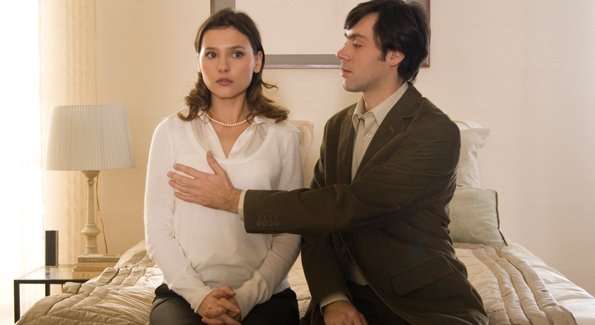-
Emmanuel Mouret: Shall We Kiss? (2007)
EMMANUEL MOURET: SHALL WE KISS? (2007)

VIRGINIE LEDOYEN, EMMANUEL MOURET
Woody meets Eric--and they make beautiful (light) music together
We deserve to know more about Emmanuel Mouret, whose films Variety critic Derek Elley has with good reason called a combination of Woody Allen and Eric Rohmer. Like Woody, Mouret not only writes and directs but is his own delicately droll romantic comedy lead--who combines suggestions of Mr. Allen with M. Jean-Pierre L�aud and Mr. Peter Sellers. How come this is his sixth film and Americans haven't seen any of them? Perhaps because Mouret is a modest filmmaker, who works his way up gradually, adding a few more minutes each time: from 50, he went up to 76, then 85, and this time he's been bold enough to go to 100 minutes. This time, besides himself, following his well-received 2006 Change of Address/Changement d'adresse, which was part of the Director's Fortnight at Cannes, he's engaged Julie Gayet, Vieginie Ledoyen, and Stefano Accorsi as co-stars.
Shall We Kiss/Un baiser s'il vous plait is an ingeniously (almost too ingeniously) constructed story-within-a-story. The beauty of it is that the frame-tale is so well-written and acted that we care about visiting textile designer Emilie (Julie Gayet) and Gabriel (Michael Cohen), who gives her a ride on a visit to Nantes, parlays that into a dinner date, then asks her for a goodnight kiss--though the body of the film is the story Emilie tells Gabriel to explain why she thinks even that one kiss would be a dangerous thing. Emilie and Gabriel are a sexy couple, and the suspension of that kiss really keeps viewers holding their breath even as they enjoy the surprises and machinations that now unfold. Mouret's humane and entertaining film is full of a sense of how delicate romantic feelings are and how seamlessly in a courtship the clumsy and the comic and the beautiful can blend into one another. Perhaps best of all, the writer-director envisions a contemporary world in which such a thing as courtship, with its presumption of mutual respect and good manners among all concerned, can still exist.
Emilie's narrative brings in lab researcher Judith (Ledoyen), best friend of math teacher Nicolas (Mouret), who explains to her in one of their weekly tete-a-tetes that he's become so starved for "closeness" (complicité) that to be in the mood to initiate a new relationship he needs a little physical affection--and a kiss--to open him up. He's tried prostitutes, but like the young hustler protagonist of Téchiné's movie, they "don't kiss"--so that essential "complicité" is lacking. Shyly he asks Judith to help out. Their first attempts at intimacy are ludicrously tentative--with very French discussion back and forth about what to do next before each move forward. They wind up having sex, and though Judith lives with pharmacist Claudio (Accorsi) and (because the renewal of "closeness" apparently "worked") Nicolas soon meets and starts cohabiting with Caline ("Cuddles," Frederique Bel), the two "best friends" eventually have to admit that they can't forget the electricity of their physical encounter. Judith has to grant she isn't so crazy about Claudio any more, and Nicolas hasn't really fallen for Caline and is just hoping he might, later.
Mouret's art is in the way he plays with the old idea of people who have trouble recognizing their own feelings, and the cliché, existing only to be smashed, that best friends can't become lovers. Eventually the inevitable must be recognized. It isn't hard for Nicolas to sit down at a bar and tell Caline he's found someone else he cares about more, and she takes it with aplomb. But Emilie cares too much about Claudio to dump him, and she knows he has never looked at anyone else and has fragile ferlings. An elaborate ruse is devised based on Claudio's passion for Schubert, and enlisting help from the cooperative Caline.
All this reminds Gabriel of something that happened to him....which is where the storytelling becomes rather intricate.
The ending is ingenious, but the fun is getting there, and the way Mouret's straightforward direction, simple camerawork, and above all his witty, well-paced dialogue keep the audience consistently engaged and delighted. The music always keeps it light--and smart, with Tchaikovsky ballet music leading off many of the early scenes, and Schubert chamber and solo piano music warmly fleshing out the emotional tone as the romance becomes more intense and more complicated. If you can watch this without having fun maybe you just don't like romantic comedy--at least not the French kind.
Shown as part of the Rendez-Vous with French Cinema at Lincoln Center, February 29-March 9, 2008; this opened in France December 12, 2007.
Last edited by Chris Knipp; 03-09-2019 at 12:44 PM.
 Posting Permissions
Posting Permissions
- You may not post new threads
- You may not post replies
- You may not post attachments
- You may not edit your posts
-
Forum Rules





 Reply With Quote
Reply With Quote
Bookmarks